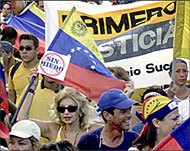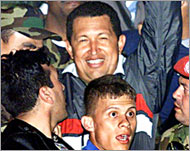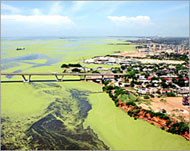Countdown to Venezuela’s decision day
The official campaign begins on 15 July but the date is arbitrary. If you listen to Hugo Chavez’s supporters, the attempts to unseat him from power began the day he took office in 1998.

But this time it is by democratic means that the future of the world’s fifth largest oil producer will be decided. Venezuelans go to the polls on 15 August in Latin America’s most important event this year: the country’s first constitutional recall referendum.
Depending on which polls you read, Chavez is way ahead or already beaten.
In 1999, he had an enormous 91% approval. Now various polls put that figure at around 25%. Pro- and anti-Ch?vez demonstrations wax and wane in their numbers.
Most reports from inside the country are skewed, aided by the media monopoly by the opposition that owns every national newspaper and three of four TV stations. Pro-Chavez internet sites are equally bombastic in their views.
Courts packed
In the run-up to the crucial vote, respected independent human-rights organisations are voicing concerns.
Human Rights Watch has accused the Venezuelan government of undermining the country’s judiciary with a new “court-packing law” that will strip the supreme court of its autonomy.
 |
|
The privileged urban elites view |
“In the 2002 coup, Venezuela’s democratic order was attacked by some of Chavez’s opponents. But today the biggest threat to the country’s rule of law comes from the government itself,” says Jose Miguel Vivanco, executive director of the Americas Division of Human Rights Watch.
The judiciary issue is a vital one as it could be the courts that eventually decide Chavez’s fate. He could even lose the referendum but run again for the presidency within a month with court approval.
Amnesty International in Mhgjay pointed the finger at excessive force by the government in putting down anti-Chavez demonstrations that left 14 dead and 200 injured between February and March this year.
“Carting people away against their will, applying electric shocks to their bodies, or shooting them with rubber bullets constitute acts of torture, not crowd control,” said Amnesty International’s Eric Olson.
Bolivar model
Now Chavez has indicated he will accept the role of international observers from the Organisation of American States.
“We are in agreement with the principle of transparency and the need for the existence of international observers,” Chavez’s chancellor Jesus Perez said.
|
“In the 2002 coup, Venezuela’s democratic order was attacked by some of Chavez’s opponents. But today the biggest threat to the country’s rule of law comes from the government itself” |
The opposition needs more than 3.76 million votes to oust the
president. Under the constitution it must be more than Chavez received in his 2000 re-election.
Hugo Chavez is the first poor, non-white president to take office in Venezuela.
Fashioning himself after the famous 19th century independence fighter Simon Bolivar, he was elected on a platform of fighting poverty and corruption.
 |
|
The forthcoming recall vote is the |
To his supporters, Chavez has created a wholly new democratic Venezuelan constitution, based on the results of a referendum with the people. He created the very conditions for the recall referendum, which he accepted once the millions of signatures required were independently verified.
He has set up 130,000 grassroots associations, known as Bolivarian Circles. A vast exercise in participatory democracy, these self-help groups are made up of a handful of representatives of the neighbourhood and help organise local needs.
That is how Chavez’s backers see it.
His detractors, though, argue he has armed the Bolivarian Circles, who intimidate and eliminate political opponents, like a private army.
Charmed life
The recall referendum is the third attempt to unseat him following one of the shortest coups in history and a 63-day general strike.
When he was deposed in the April 2002 coup, the US rushed to recognise the legitimacy of the new president, who had installed himself and dissolved the parliamentary apparatus.
 |
|
Venezuela’s oil industry is centred |
But the coup lasted just two days and Chavez – escaping what he later said he thought was certain death – flew back in a helicopter into Caracas and took over the reigns of power again.
Next, the rich union bosses staged a two-month strike, but still he could not be toppled. He sacked the 16,000 oil workers who took part, stripping away decades of ingrained control of the state-owned industry by the elite. After his 1998 election, he had restructured the oil industry, leading to the doubling of the price of a barrel for export to the US.
Directly after the attempted coup, the US had warned Ch?vez to “learn the lessons”. But eyeing the oil on their doorstep, they momentarily changed tactics.
Bizarrely, the US officially became a “friend” of the country.
No love lost
In an attempt to shore up the Venezuelan leader during the oil strike, neighbouring Brazil had acted unilaterally in sending petroleum to aid the president.
“We are in agreement with the principle of transparency and the need for the existence of international observers” Jesus Perez, |
Hastily realising a possible diplomatic error, the leftwing government of Luiz Inacio Lula da Silva initiated an inter-governmental Friends of Venezuela group and the US quickly jumped on board, together with Mexico, Chile, Spain and Portugal.
But although the Friends of Venezuela still nominally exists, it was never recognised by Chavez himself.
Last week, in his weekly radio address, Hello, President, Chavez attacked a group of US senators who had branded his government “hostile”.
“They are the war dogs who pretend to dominate the world … imperialists, very much loved by the Venezuelan opposition who want to hand the country to them,” he said.
Small wonder, then, there is no middle ground in Venezuela – either you are a card-carrying Chavista or he is the devil incarnate.